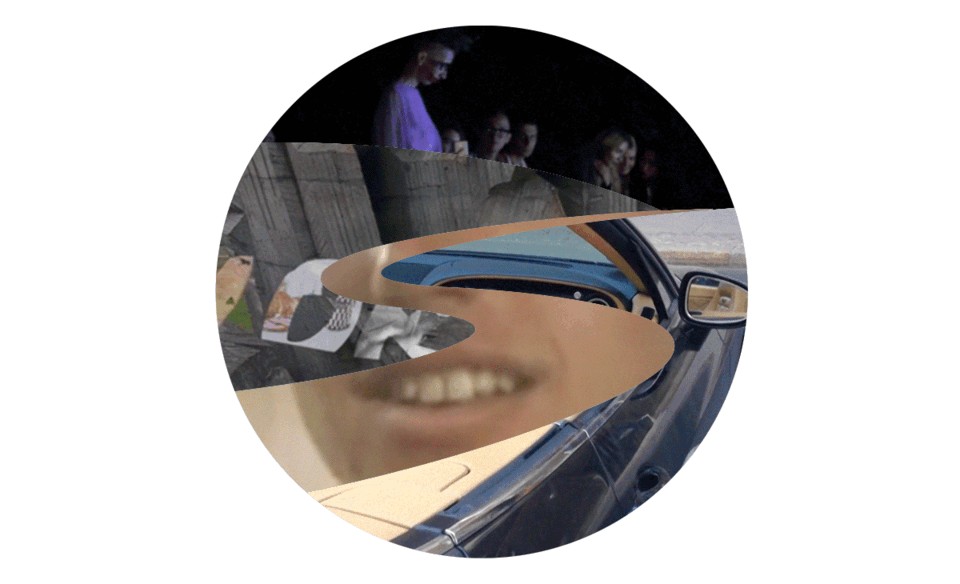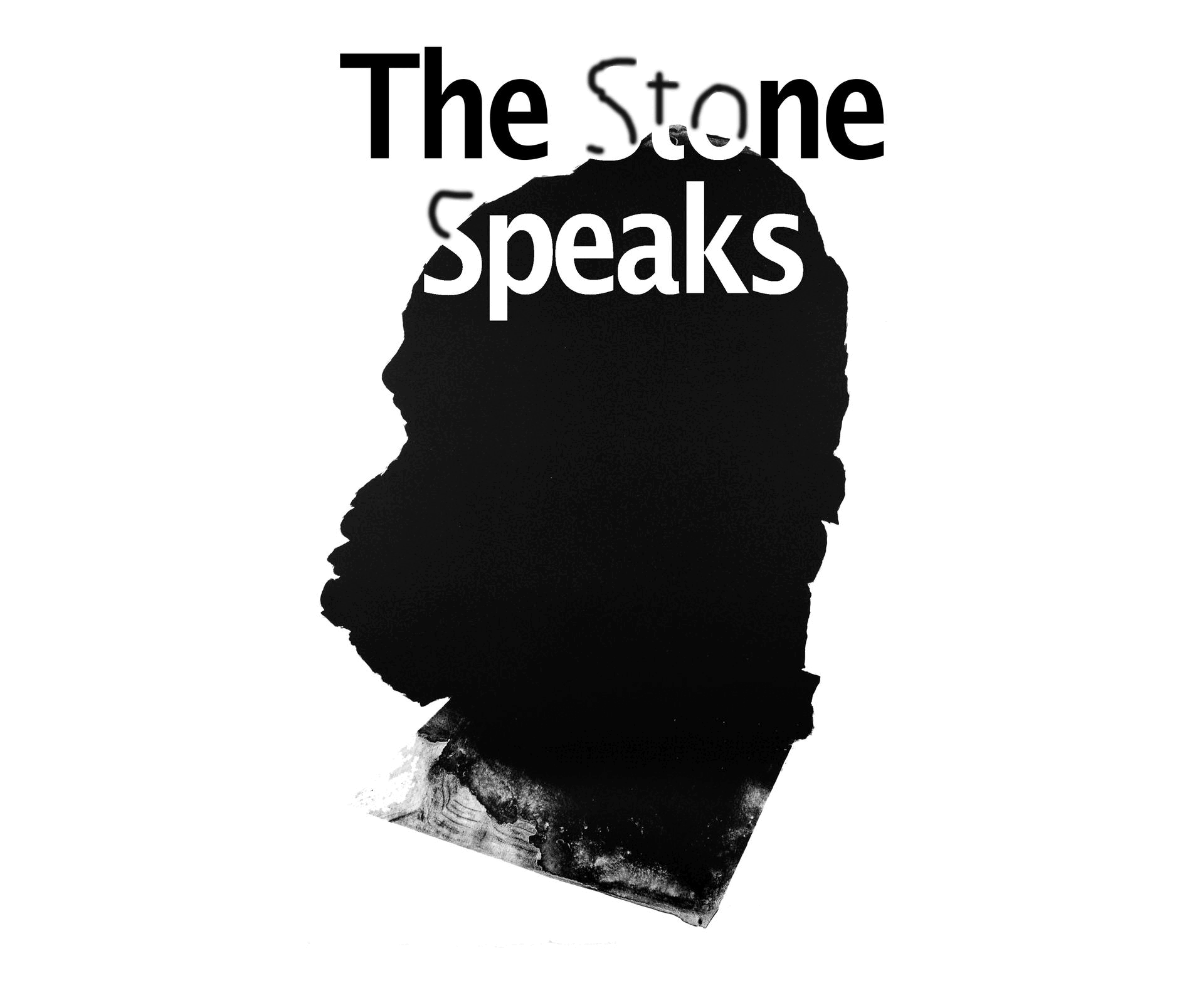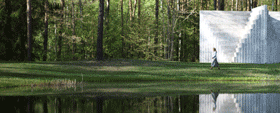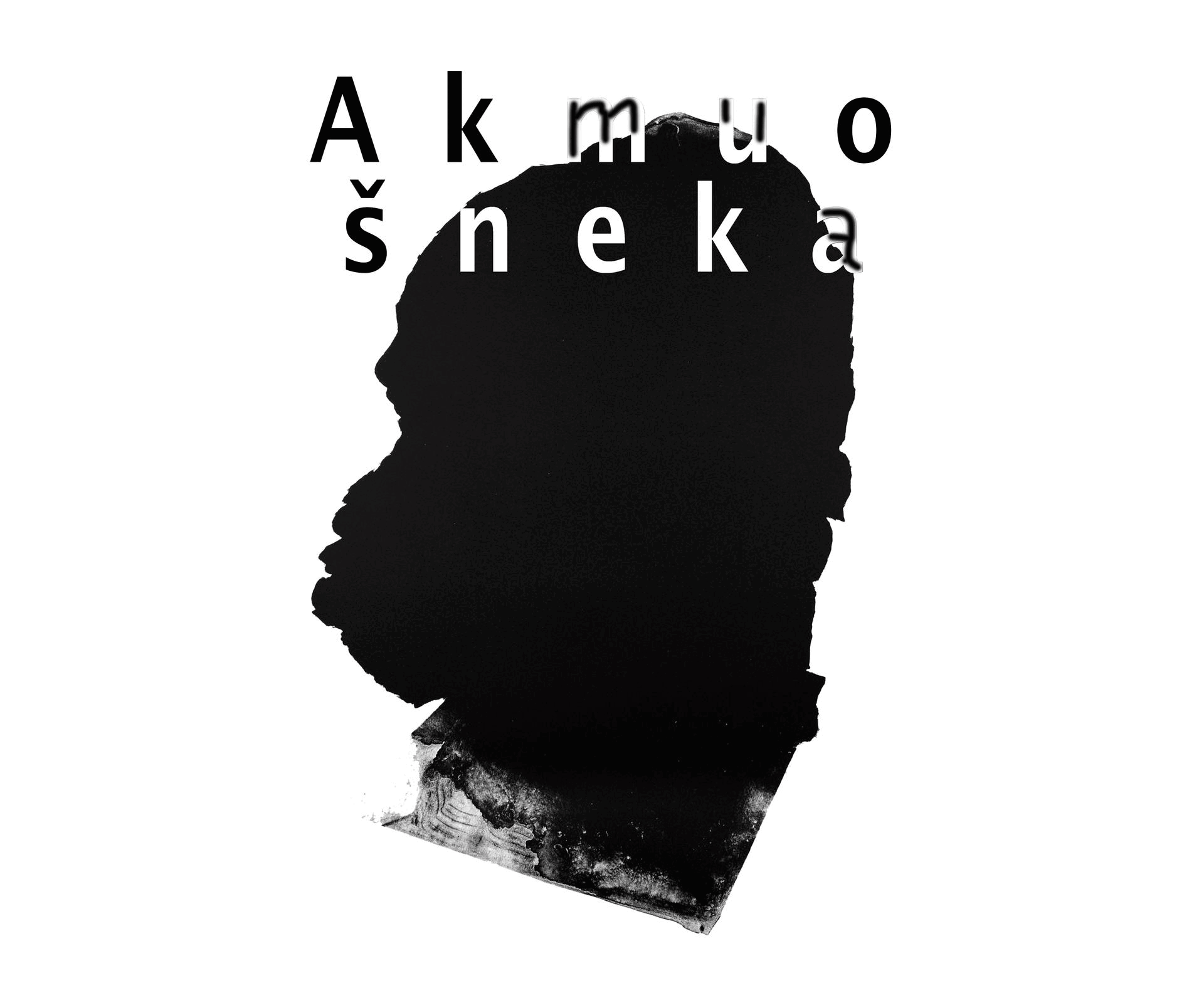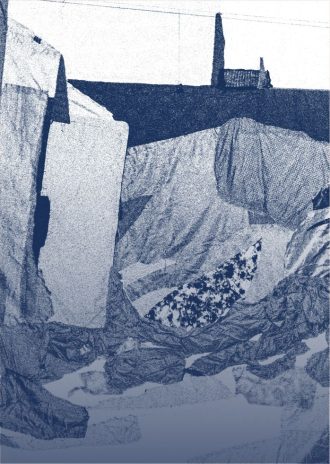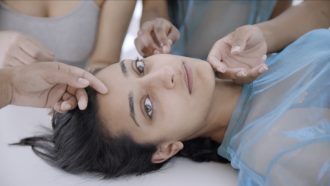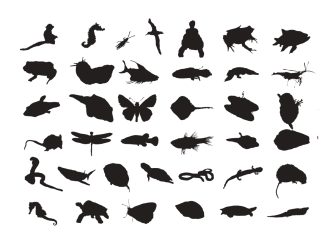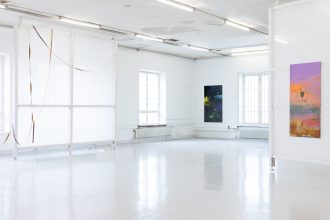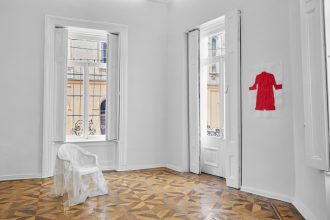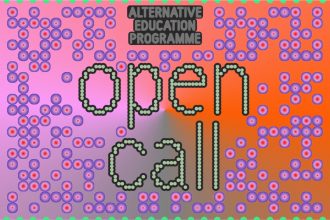Niamh Seana Meehan left Kaunas on the 8th of March, five days before the quarantine was applied in Lithuania and more or less throughout the whole of Europe. During this interview, the air had already thickened with all kinds of fear, especially with fear of the unknown, the instability and pressure to perform successfully on one’s own and individually. Niamh initially came to Kaunas for three weeks to participate in Kaunas Artists’ House Reciprocal Residency Programme ‘DeMo’ (Decoding Modernity)*. The programme has been specifically aimed at issues generated by the perception of modernity as something complete or finite. It is no accident that today we are staring at a huge economic crisis, the cultural industry sinking further into greater obscurity. Coincidentally, creating support structures and making them work for artists having hard times financially and mentally became one of the main threads permeating this interview with Niamh.
Agnė Bagdžiūnaitė: Let’s start with the way you felt being an artist in residence at Kaunas Artists’ House, did you feel more as a tourist, as a researcher or a stranger? It could be everything at the same time but which would you emphasise more?
Niamh Seana Meehan: I got myself thinking about this question already. In my previous experience being on residencies, I always felt like a tourist and always felt like being on a break or a holiday. Here in Kaunas, especially at Kaunas Artists’ House, I felt like I’m here to research something. When I arrived, I was introduced to everyone who worked there and they told me to ask them for any help I might need. Feeling like I had access to all these different facilities didn’t make me feel like a tourist at all. Another reason has been the intense preoccupation with my work there that I am bringing back to Ireland for a show at CCA Derry~Londonderry. Because of this, I haven’t had much time to explore the city or collect more information about its different sites in a more touristy kind of vibe. And finally, it’s also because I was staying at Cultural Centre. Being in that building with all the activities that were happening there made me feel as though I had a real purpose. If I had been staying in an Airbnb or a hotel, then I would be feeling much more like a tourist. Being associated with that building gave me the feeling as if I was a researcher, and I liked that.
A.B.: As you suggested, what’s important is how the feeling of being a tourist or not depends on where artists in residence stay and how they are treated. I would like to turn this suggestion about location and treatment into a broader question about lines and borders in relation to identity as I know this falls within your research topics. From the border perspective, Northern Ireland is considered part of the UK. How is it important for you to emphasise that you are Irish?
N.S.M.: I am from Northern Ireland. I am technically from the UK, but this is where it gets problematic. Because of Brexit and the discussion around borders, questions about identity have risen again. For me, living in Northern Ireland, these questions were always problematic even when I was at school. But it is not Brexit that highlighted them, they have always been there. When I go to another country outside of the UK, I am Irish. But when I go back home, I am Northern Irish, or someone could even class me as British, but I don’t associate myself with any of those things because I have stated already that I am Irish.
The significance of identity and how you deal with it depends on the geography of where you grew up. I was raised in a place where we had hunger strikes. As a result, I was very prone to the language and imagery that was associated with trouble. When I was younger, I was Irish. That’s how I was brought up, and geographically it also meant that I was Irish. It wasn’t until I grew up and moved to England and moved back to Northern Ireland that the discussion questioning my Irish identity started taking place. I think I struggled to understand it then and being 27 years old now the struggle still continues for me.
I sometimes feel The Republic of Ireland or the South just pushes us away and doesn’t really want anything to do with us. You would think that we are on the same island but actually we are pretty separate. The North is just by itself, but as we are attached to the UK appears somewhat in between. All these young voices and young people in Northern Ireland don’t really have a clue about who they are or what’s happening and the UK and the South of Ireland don’t really understand the severity of that. When you are growing up and you don’t really understand who you are, it’s really unhealthy.
A.B.: With Brexit having just happened, do you think this will help develop more of a sense of identity and resolve this crisis you are mentioning in Northern Ireland? From what I have read, England’s decision to leave the European Union doesn’t reflect the standpoint of everyone in the United Kingdom. Other regions like Scotland were definitely against Brexit, as was Northern Ireland as well, am I right?
N.S.M.: I know that when the election came out, Northern Ireland voted to stay in the EU and that was an overall vote. Brexit, or the discussions of Brexit, definitely highlighted the problems with Northern Ireland. I just think that generally everyone is lost and no one knows what is going to happen. Scotland has been discussing having the referendum for themselves to decide on their own future and independence. While it’s just my opinion, if Scotland goes and moves that way it will motivate Northern Ireland to hold similar discussions about a united Ireland. But when that will happen I have no idea.

“How do you like your border?”, on-going collaborative performance project with Brennagh Meehan, 2019, at Platform Arts, Belfast, Northern Ireland

“How do you like your border?”, on-going collaborative performance project with Brennagh Meehan, 2019, at Platform Arts, Belfast, Northern Ireland
A.B.: When you say people don’t know what will happen, don’t you think this is a global feeling, that people worldwide don’t really know what awaits them in their near future, even tomorrow? Additionally, you are an artist, especially working within the framework of performance art, which is a very precarious place or profession to be in. And if that wasn’t enough, there are also discussions about the Brexit visa regime. If UK artists want to travel to Europe to make work they will have to apply for visas. The same rules apply for artists in Europe. It all adds up, making precarity even more precarious.
N.S.M.: Being an artist means never being sure of the next job or opportunity. It means constantly applying for open calls or getting in contact with others to potentially collaborate with. Ultimately, it means dealing literally with the unknown. In terms of Brexit, I don’t know, I always associated it with the word ‘emergent’. I have been an emergent artist and being emerging as to what is going to happen is actually quite scary. These recent discussions about requiring visas if you need to perform somewhere within the EU creates a complete mess in my head. I can’t talk for all artists when I say this, but as artists we are not great with deadlines. If I miss the deadline I will miss the opportunity to have a job. Actually, my passport is part of the EU, I have an Irish passport but I am not technically from the EU so how do I apply for something? Is there a special form for that? I don’t even know how to work it out bureaucratically. The thing is when I apply for stuff, they normally ask for some sort of identification and for my home address. Obviously my home address will come up as Northern Ireland, but then I have got an EU passport and I honestly don’t know how it would work.
If the UK made residency of Northern Ireland passports, meaning non-Irish passports, then more serious troubles will be returning. This is the main fear of the people in Northern Ireland, who are scared that if something like that happens, the Good Friday Agreement* is going to vanish and that is the severity of it. I feel that England as a country is oblivious to this because of something Theresa May once said which I will always take with me: In comparison to talk about Northern Ireland we’ll come back to it later. We just have to get this done…Her saying we’ll come back to it later at some point, we just need to get Brexit done showed how it wasn’t being thought of in the context it needed to be. We are all supposed to be moving forward but appear to be going three steps back.
A.B.: Do you think that artists should talk about these problems together and make themselves loud, do you think solidarity between artists on these issues, for example about visas, is possible?
N.S.M.: I definitely think so. I feel very strongly about the artists that are emerging especially. We would be extremely foolish not to make ourselves loud. Everything that is going on and not only Brexit, I mean the actual world at the minute, has to be reconsidered. Showing in the gallery or in the museum for me now is not enough and it is something that I feel incredibly strongly about. Not all artists stand united, but going out to the public maybe through the performative pieces of work, and engaging people into these things that are happening even with the visa permits, has to be on our agenda. You know people have gotten to the point where they don’t look at the news or they don’t want to know what is happening and I can empathise with that. However, they need to be aware of the young people who are trying to make a life now. Being an artist is not easy. It is not always easy to get a job in your country. You have to go to other places in order to survive as an artist.
A.B.: Do you think artists from England would be up for engaging in a solidarity network with Scottish, Welsh and Irish artists? Are they interested in what is going on in Northern Ireland, for example?
N.S.M: I can’t speak for everyone, but in the past I haven’t seen much engagement from English artists. As I have mentioned before England is pretty ignorant about what is happening. Though I feel like if we went as a collective or a group and said look at what’s happening to us it might draw their attention. On the other hand, people who came to live in England from abroad must be facing the same question, that same uncertainty, so maybe that is the key group who might be interested in forming some sort of solidarity.
A.B.: When I think about the relationship between art and politics, it is widely perceived that most artists, like most people, weren’t really interested in what was happening within politics until Brexit happened, until Orbán and Trump got into power. Suddenly it affected everyone and the position of artists too. Do you think that the engagement of artists in politics has become more intense and more active now than it was before?
N.S.M.: Personally I think it has to do with how you were brought up and what your influences were when you were younger. Generally, I see a lot of works that have been made or even titles of works that have references to the things that are happening now in the world. But I think the concept of sleepwalking through life when you think that none of these things will affect you personally is still very prevalent. Social media plays a huge role in turning people into sleepwalkers.
In Belfast at the minute, lecturers are striking because of wages and when I was at university my educators were also striking because of pension schemes. As artists we are privileged to have the platforms where we can advocate and showcase the real problems that are happening.
Undeniably, there is such a thing as an art bubble and those artists do not necessarily go out of that bubble keeping it to the artist communities which I think it isn’t healthy to do. Making work in relation to our environment, to what is happening to us, and showing it to wider audiences is just another form of communication and advocacy to become aware of what’s happening.

Performance still from FIX19 HA AH Open Call with Catalystarts and Bbeyond, 2019
A.B.: So do you think artistic tools can and should be used for this kind of purpose?
N.S.M.: Yes, and I think of it positively. Let’s take the concept of the show opening; people just might go to the show because they can find alcohol there. Let’s be completely honest. A person can go into that space where an artist has made a political piece of work. The same person can then engage in the conversation that wouldn’t have happened otherwise unless they would have walked into that art space. This needs to happen not only in art institutions but outside of it to get more public engagement. Moreover, I don’t think it is right to do it on your own as an artist. You need groups and there are a lot of artists so why not just group together and start having a conversation.
A.B.: And do you have any experience of being in a group of artists?
N.S.M.: I often work with a group of performance artists and I find it healthy to do that. Having the studio space and going to your studio space, just closing the door and making work; I don’t think that is mentally healthy. Healthy, is the only word I have. I think joining together and sitting as a group for a coffee and discussing things, certain themes and threads are going to come out. Collaborations and working with groups are for the better. People are going to listen to ten voices rather than one. That is the reality of it. But I can also see from the outsider’s view; trying to access certain groups of artists can seem like quite a daunting thing. Everyone knows each other when you are maybe new or new to the place.
Before I came here I started the concept that is called Making Space. I have a unit, a certain place within the shopping centre. It is a space created for diverse voices as I don’t want it to be exclusively for artists. You can just literally go there and say “Look I want to discuss something”. It is also a space that people can access from borth North and South of Ireland. That is very important to me because artists from the South of Ireland don’t seem to be applying for opportunities in the North and vice versa. They think that it is not possible to get such opportunities. I created the space for these conversations to develop, and why we feel these barriers are there, for example.
I want not only artists to come to the space but also members of the local and international communities to come there and propose to do something together. In the beginning, we had a series of conversations about things we thought we needed to address, the issues we were facing. One of the issues we were dealing with recently, among the artists, was the language used in rejection emails from institutions. We were discussing coping mechanisms and the tools we could use to deal with it. Everything started with conversations which then transpired into a series of events. The space which is in the shopping mall has no limitations in terms of topics and themes.
Customers or workers of the shopping centre can come in. A lot of artists normally have to have an extra job to support themselves. I find it a bit humorous that we are in the shopping centre because we are all in there already with part time jobs. And what strikes me is that sometimes people can’t really grasp the situation of the artists. They think that all the artists can live from what they sell on the art market. After several conversations with people about the precariousness of being an artist they start proposing donations or other kinds of support. For that matter, the space helps connect two sometimes seemingly very different worlds.

“Arrival From Elsewhere”, performance at Kaunas Artists’ House, 2020

“Arrival From Elsewhere”, performance at Kaunas Artists’ House, 2020
* Kaunas Artists’ House Reciprocal Residency Programme ‘DeMo’” (Decoding Modernity) was carried out together with Centre for Contemporary Art Derry~Londonderry (CCA) and Lithuanian Cultural Institute.

